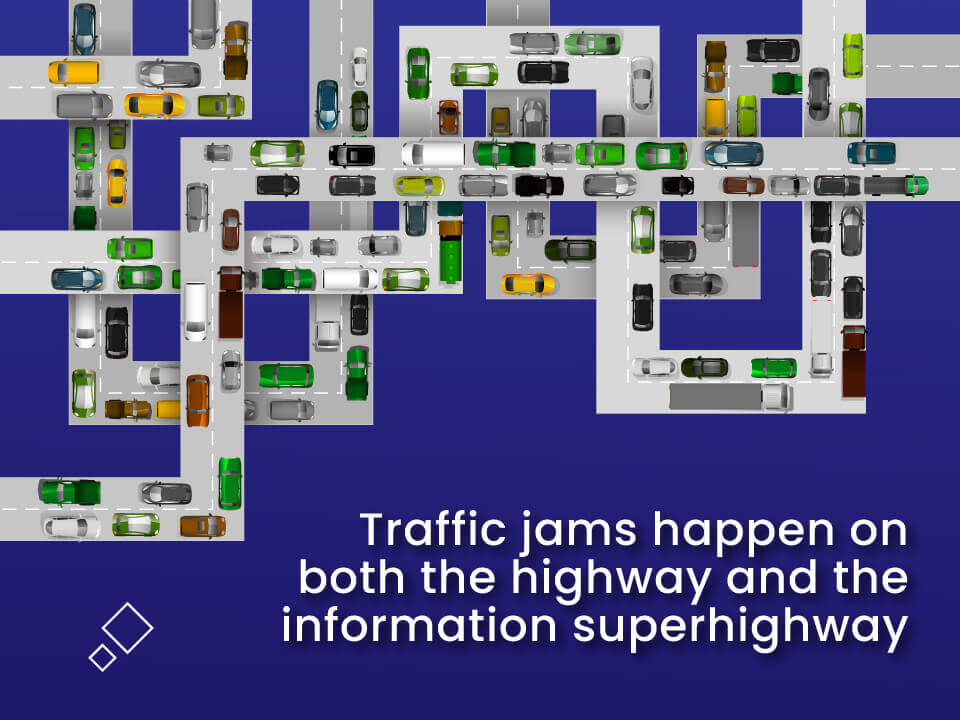Lower your internet bill
61% of people overpay for their internet.
Are you one of them?
Unlock exclusive offers in your area!
Call now
[tel]Enter zip code
1 Star is Poor & 5 Stars is Excellent.
* Required

Written by Rosslyn Elliott - Pub. Dec 20, 2022 / Updated Mar 18, 2024
Table of Contents
Are you happy with your Internet service?

About the author
You’ve just finished a long workday, and you’re looking forward to relaxing on the couch with a snack and some web browsing.
Catching up on the day’s news and entertainment will help you switch gears and start off your evening with a laugh or two. But when you get on your tablet, things don’t go the way you hoped.
Screens aren’t loading, and they’re timing out. Videos won’t start. You have entered the maximum frustration zone… when you get slow internet at night.
So what can you do about it? First, it helps to understand the possible reasons for your slow internet connection. Once you’ve figured out what might be affecting your internet performance, you can try a few quick solutions to fix slow internet.
The first question to ask yourself is whether you’re mostly using your home internet service at night. If so, that may be why you notice that your internet speed is poor at night. If you’re spending your days on a work computer, for example, you might not notice that your home internet connection is slow during the day as well as at night.
Keep that question in mind as you go through this quick guide to the reasons for slow internet, and how to fix it.
Common reasons for the internet to slow down at night include network congestion, internet usage, internet equipment, and types of plans from different internet providers. Each of these problems has a different solution, so keep reading to get help with your slow internet speeds!

At 6 p.m., many internet users are finishing up with work and school and getting on the internet for some fun on their digital devices. This “internet rush hour" actually lasts for several hours, until about 11 p.m. During these peak hours, internet traffic increases. Having more people cramming the bandwidth works just like more people cramming a highway. Everything can jam up, both on the highway and the information superhighway, when too much traffic causes congestion.
Congestion caused by more internet traffic is known as network congestion.
There are two main causes of network congestion. Either your internet service provider is experiencing congestion on a wide scale, or you are experiencing congestion on your home network.

Internet service providers have their own bandwidth limitations that determine how much data can be streaming through their internet networks at any time. That’s why some providers structure their plans by data allowances. The ISPs use data caps as a way to fairly divide their bandwidth among their customers.
When congestion gets intense at internet rush hour, some internet providers throttle speed on the network. Throttling means that an ISP reduces your internet speeds. And that slow speed can be the source of your frustration with pages hanging and not loading, or the dreaded connection time-out notices.
If you are on a plan with a data allowance, your internet provider will throttle your speed when you exceed your monthly data cap. Don’t forget to check whether that is the cause of your slow internet. It can happen at any time of day, but you may be more likely to notice at night.
You can check your data usage through your router’s app or log-in page. ISPs also frequently provide a page where you can track your data usage. Third-party apps from Google Play or the App Store will also monitor your data consumption.
One important note: fiber internet providers are much less likely to experience network-wide congestion because their fiber-optic cables have such massive bandwidth. If you are experiencing frequent congestion, you might want to check out top internet service providers in your area to see if any of them offer fiber.
But before you switch providers, there’s another possibility you should check out first.
If you’re experiencing slow internet at night, there’s one obvious cause that you might be able to detect right away. Are too many people in your home using too much bandwidth at the same time? If you’re the only internet user in your home, this probably isn’t the problem, unless you have six devices streaming video at once. But if you have even three people in your household and you don’t have a lot of speed in your plan, your combined internet usage may overwhelm your home network.
Sometimes, adjusting your equipment may give you faster internet speeds.
If your router is behind too many walls, or on the wrong side of a microwave, or just too far away in a big house, it can give you a weak Wi-Fi signal.
Another cause of slow internet might be that one of your devices is outdated, including your tablet, computer, gaming console, modem or router. If a device is too old, it may not be designed for today’s Wi-Fi speeds.
Routers often function on two frequencies. Sometimes, switching the frequency on your router can also increase your internet speeds.

It’s not hard to troubleshoot why your internet might be slow, either at night or at other times. If you find your internet connection is only slow at night, that will help you diagnose the cause of your slow internet. So the first thing to do is test your internet speed, both at night and at other times, to know exactly when you’re experiencing slowdowns. If you can, also test your speed both when you are on Wi-Fi and when you are plugged directly into a wired connection.
If you find that your slow internet really is only occurring at internet peak hours, the problem may be throttling or bandwidth. Read on for how to fix each of the causes of slow internet.

If you are sure that your internet is slower at night than at any other time of day, the cause is probably related to too many users on the network at once. This problem, network congestion, can happen either on a big scale with your internet service provider’s bandwidth, or on a small scale because your household is swamping its bandwidth.
Fiber internet is the best solution for network congestion. But for the many households that can’t yet get fiber, there are other solutions too.
Internet peak hours occur between 6 p.m. and 11 p.m. Using the internet outside of those hours will increase your internet speed, if you are experiencing network congestion.


About the author
Congratulations, you qualify for deals on internet plans.
Speak with our specialists to access all local discounts and limited time offers in your area.
[tel]61% of people overpay for their internet.
Are you one of them?
Unlock exclusive offers in your area!
Call now
[tel]Enter zip code